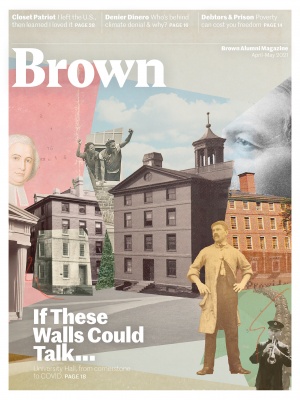When this issue went to press, the state had yet to approve plans for Brown’s Commencement, but students around the country were using Brown’s idea—to allow members of the Class of 2021 to march through the Gates, no guests or alums in attendance—to petition their own schools for an in-person event.
I sympathize. Also at press time, I was planning a family reunion and crossing my fingers that by June, the public health situation will allow me to have a couple of dozen people safely stop by my backyard. Apparently it wasn’t just me, because by early March, it was already hard to secure a weekend tent rental. We’re all hungering for contact, for celebration, for a feeling of lightness so long missing from public and private life.
Alas, in-person Brown Reunion events won’t happen this year, although Alumni Relations staff are at work on virtual festivities. Vaccine news notwithstanding, it was just too soon.
Undergrad researcher Molly Cook ’22 has an interesting take on all that COVID-related news we’ve been obsessively consuming. Her research shows coverage in major U.S. media was darker in tone (91 percent negative from March to July 2020) than in the international press (54 percent) or scientific journals (65 percent). The negativity didn’t let up when cases declined last summer, nor when vaccine progress was announced.
In five days the pop-up clinic was open, and three weeks later it had vaccinated a third of the town.
“I expect that for lots of people, the gut reaction might be, ‘Well, of course the tone is going to be negative. Hundreds of thousands of lives have been lost,’” Cook told Brown social science writer Jill Kimball. “But I think it’s important to note that we’re making a relative statement.” Her advice? “I find it valuable to broaden my perspective by reading trusted international news sources and top scientific journals. If you’re not diversifying, it’s likely you’re not getting the full picture.”
In the spirit of positivity, I’d like to share news about Gillian Epstein Baudo ’96, who at the turn of the year got a text from one of the fellow founding members of the Fabulous Ladies Book Club. They hadn’t met in person for too long, but her friend—an ob/gyn in their small mountain town of Ruidoso, N.Mex.—had exciting news: The state wanted her husband to host a vaccination site at his small medical practice. The Fabulous Ladies—lured unnecessarily by the promise of mimosas, a Washington Post article relates—started working 50 hours a week, maxing out data plans, setting up a phone hotline, and registering sometimes technology-challenged patients in a town that’s a haven for retirees. In five days, the pop-up clinic was open, and three weeks later, it had vaccinated almost a third of the town. The Ladies all have full-time day jobs, Baudo wrote in an email, and “are doing this because we feel a strong sense of commitment to this community and to this cause.”
Wishing brighter days to us all.




